Share
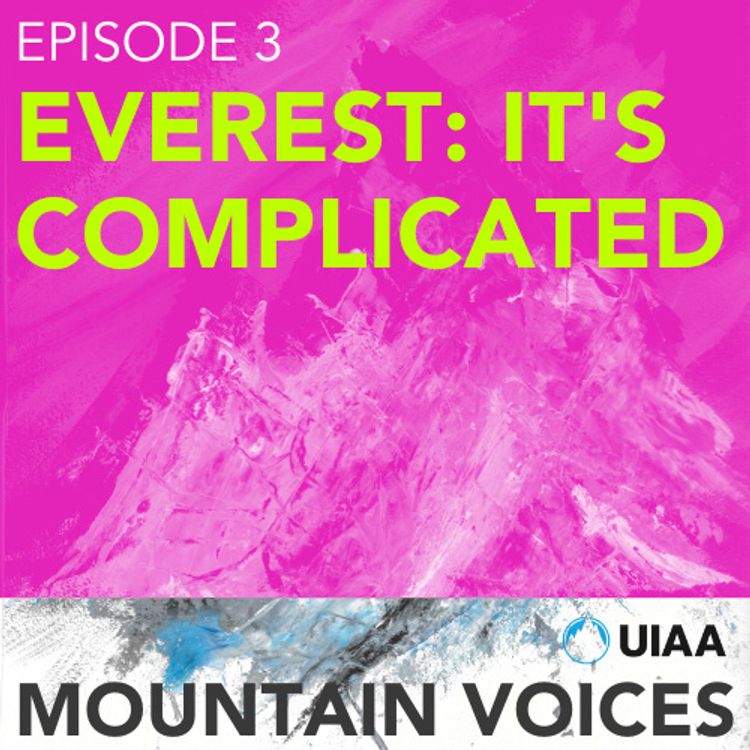
Mountain Voices
Everest: It's Complicated
Ahead of the 2024 Everest Climbing Season, Mountain Voices shines a spotlight on the world's highest, most iconic and debated mountain.
It is the 100th anniversary of Mallory and Irvine’s fated last attempt to climb Everest. They’ve come to define that heroic post first world war period of exploration in their experimental oxygen sets and (by our standards) primitive clothing.
What would define the present age? The age of commercialisation? A trophy achievement for rich individuals with limited climbing experience, blindly sliding up a rope fixed by teams of Sherpas? Is climbing Everest actually an achievement? And what is the current situation for the sherpas who support every climb? Opinions come from three expert figures:
Ed Douglas the author of numerous books on Everest and the Himalayan region including the biography of Tenzing Norgay, Chomolungma Sings the Blues: Travels Round Everest and Himalaya: A Human History.
Victor Saunders is a UIAGM guide who’s led numerous ascents around the world. His 1st ascents include Panch Chuli V and Golden Pillar of Spantik. His most recent was Sersank in 2016. Victor's books have won prizes in Canada France and England. he’s a former president of the Alpine Club, and has made SIX ascents of Everest.
Young Hoon Oh, is a Korean climber and anthropologist. He has made four attempts on Mt Everest, three of which were to do with his ethnographic research and he summited in 2012. He’s also lived among Nepali for two years and he’s a contributory author of Other Everests: One mountain, many worlds, a scholarly book published in 2023.
--
Mountain Voices is a podcast series from the International Climbing and Mountaineering Federation (UIAA)
Presented and produced by Tarquin Cooper
Co-produced by Peter Bourne
Edited by Tom Tushaw
More episodes
View all episodes
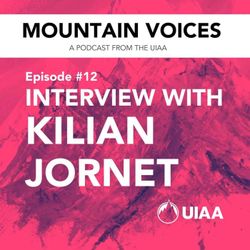
6. Exclusive Interview with Kilian Jornet
36:46||Season 2, Ep. 6An exclusive interview with Kilian Jornet, an athlete whose feats almost defy description. A multiple ski mountaineering world champion and a trail and ultra running legend, Kilian has set speed records on numerous mountains - most recently his 19-day challenge to climb all 82 4000m peaks of the Alps, a classification recognised by the UIAA.In this interview, Kilian discusses: the logistical and physical challenges of that feat; the current initiatives of Kilian Jornet Foundation which focus on the environment, youth engagement and inclusion; his thoughts on the importance of ethics in mountaineering; reflections on some of his notable achievements including his time on Everest.Further Information:https://www.kilianjornet.cat/https://www.kilianjornetfoundation.org/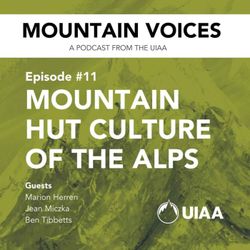
5. Mountain hut culture of the Alps
53:46||Season 2, Ep. 5Episode 11 of Mountain Voices takes a deep dive into the mountain hut culture of the Alps. What makes a great hut? Why do huts exist? What impact is climate change having on hut operations and maintenance?Part one features Ben Tibbetts, an IFMGA mountain guide and a photographer, artist and writer based in Chamonix, France. Ben has published a number of books dedicated to his passion for huts, notably ‘4000m peaks of the Alps guidebook’ and coming soon Volume 1 of Cabin Wild – West Mediterranean to Mont Blanc. Available to pre-order here. Ben is joined by UIAA Management Board member and FFCAM (Fédération Française des clubs alpins et de montagne ) Board member Jean Miczka, a hut expert who has written a thesis dedicated to how mountain guides are adapting their activities due to climate change.In part two, Marion Herren, a hut specialist working for the Swiss Alpine Club (SAC), provides an overview of the federation’s network of huts across the Alps, the current challenges faced in operating huts and what makes these locations so compelling.Links to publications by Ben Tibbetts:https://www.bentibbetts.com/4000m-peaks-of-the-alps-guidebook/https://www.bentibbetts.com/product/cabin-wild-alpine-bivouac-huts/Climate change case studies/huts by the UIAA:https://www.theuiaa.org/german-alpine-club-setting-standards-in-climate-action/https://www.theuiaa.org/climate-change-case-study-abbot-pass-hut/https://www.theuiaa.org/the-cost-of-climate-change-the-story-of-the-swiss-alpine-clubs-huts/Details on hut exchange project for UIAA members:https://www.theuiaa.org/mountain-huts/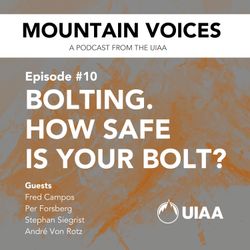
4. Bolting: How Safe is Your Bolt?
49:23||Season 2, Ep. 4This episode of Mountain Voices explores the safety and ethics of climbing bolts. In part 1 renowned Swiss climber and guide Stephan Siegrist and International Climbing and Mountaineering Federation CEO André von Rotz explore the bolting culture in Switzerland, notably the importance of preserving historic routes, and introduce the Swiss Rebolting Project.In part two, von Rotz is joined by UIAA Safety Commission members Fred Campos and Per Forsberg who delve into the science of bolt corrosion—particularly the hidden dangers of stress corrosion cracking in humid and coastal environments.In recent years, the UIAA has dedicated significant investment, some 200,000 euros and counting, primarily to research related to rock anchors and bolts. Initially, this centred around the subject of corrosion and stress corrosion cracking failure. A significant milestone was reached when the updated UIAA Rock Anchors Standard was released in 2020. While bolt failures are rare, the consequences can be severe, underscoring the importance of using corrosion-tested gear, like that certified under the UIAA’s 123 Standard. The panel discusses the ambition behind the “Bolts That Last a Century” initiative, which aims to preserve both safety and rock integrity for future generations.Discover more about the UIAA’s work in climber safety and rock anchors:https://www.theuiaa.org/safety/https://www.theuiaa.org/safety/rockanchors/Support the UIAA’s research into climber safety by making a donation:https://www.theuiaa.org/donate/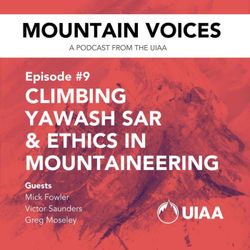
3. Climbing Yawash Sar & ethics in mountaineering
57:28||Season 2, Ep. 3Episode 9 of Mountain Voices focuses on ethics in mountaineering inspired by the release of the UIAA Declaration on Hiking, Climbing and Mountaineering earlier this year.Part 1 (00:00-35:57)Is dedicated to adventure. Alpine legends Mick Fowler and Victor Saunders, discuss their 2024 first ascent of Yawash Sar in the Karakorum.They first climbed together based in London in the late 70s where their enthusiasm for Scottish ice would go down in folklore – they once drove the 1,000km from London to Scotland and back 11 weekends in a row often pinching first ascents from the locals. In 1987 they made a landmark first ascent of the Golden Pillar of Spantik over six days.For many years their paths diverged, Mick focused on remote climbs in places like Tibet’s Nyaingentangla East – remarkable given he usually only had three weeks holiday as a government tax inspector, while Victor worked as a mountain guide, including on Mt Everest. But lately they’ve reprised their partnership, most recently in 2024 with the first ascent of Yawash Sar in the Karakorum. They’re in their late 60s mid 70s respectively, they’re still climbing, still making first ascents, and I believe, despite some impressively uncomfortable bivouacs, still friends…?Part 2 (36:49-46:54)Greg Moseley, UIAA Mountaineering Commission President, discusses what inspired the creation of the new UIAA Declaration, its importance and its guiding principles.Part 3 (47:50-57:05)Victor Saunders, also UIAA Mountaineering Commission Vice President, and author of a number of chapters in the UIAA Declaration discusses the role of ethics in mountaineering, ‘the rules of the game’.Discover more here:https://www.theuiaa.org/uiaa-declaration/--Mountain Voices is a podcast from the UIAA. Throughout each series, the UIAA explores different climbing and mountaineering topics. The series provide a platform for both experts from the UIAA and renowned figures from the mountain world to share their views and opinions. Each series is made of up of six episodes. Season 2 launched in March 2025.https://www.theuiaa.org/mountainvoices/Presented and produced by Tarquin CooperCo-produced by Peter BourneEdited by Tom Tushaw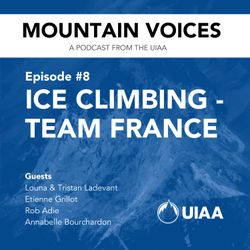
2. Ice Climbing: Team France
49:21||Season 2, Ep. 2Episode 8 of Mountain Voices focuses on competition ice climbing following the organisation of the 2024-2025 UIAA Ice Climbing World Tour. The sport is at a crucial juncture – the 2024-2025 season was the biggest in a number of year in terms of the number of events and participating athletes and national federations. In late 2024, the UIAA created World Ice Climbing, a dedicated Operating Unit focused on overseeing the development and organsiation of the sport. Furthermore, with the 2030 Olympic Winter Games being held in the French Alps, the prospect of ice climbing becoming an official Olympic sport is in the spotlight.Part 1 (00:00 - 29:50)An exclusive interview with the Ladevant brothers – Tristan and Louna, two of the most successful climbers on the World Tour. The discuss their journey into ice climbing, their sibling rivalry and the support they provide each other and their hopes for the future.Part 2 (29:51 - 38:20)Rob Adie, UIAA Competition Manager, and Etienne Grillot, World Ice Climbing Board, discuss the road map for ice climbing to follow in order for it to be considered as a future Olympic Winter Games competition sport.Part 3 (39:49- 49:01)Annabelle Bouchardon, former World Tour ice climber, explains how competition ice climbing can form a pathway into a career in mountaineering and how the skills learnt on the competition walls can translate to the high mountains.--Mountain Voices is a podcast from the UIAA. Throughout each series, the UIAA explores different climbing and mountaineering topics. The series provide a platform for both experts from the UIAA and renowned figures from the mountain world to share their views and opinions. Each series is made of up of six episodes. Season 2 launched in March 2025.https://www.theuiaa.org/mountainvoices/Presented and produced by Tarquin CooperCo-produced by Peter BourneEdited by Tom Tushaw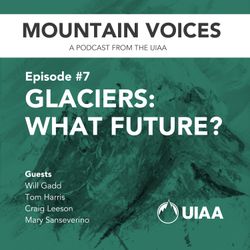
1. Glaciers: What Future?
53:28||Season 2, Ep. 1Welcome to Series 2 of Mountain Voices, the podcast from the UIAA – International Climbing and Mountaineering Federation.The United Nations has declared 2025 as the International Year of Glaciers’ Preservation. Starting from 2025, March 21 is recognised as the World Day for Glaciers.As part of its work in mountain protection and in the field of climate change, the UIAA has committed to playing an active role throughout activities in 2025 and beyond. This podcast episode forms part of that commitment. In this episode we hear from a number of glacier experts:Part 1 (01:15 - 26:24)Will Gadd, renowned Canadian mixed and ice climberMary Sanseverino, mountaineer, independent mountain studies researcher, Vice President of the UIAA Mountain Protection CommissionDiscussion on the importance of International Year of Glaciers’ Preservation, the need to engage people with the subject on an emotional level, and a focus on repeat photography and the plight of glaciers in Canada, notably the Athabasca in the Canadian RockiesPart 2 (26:25 - 43:00)Filmmaker Craig Leeson discusses his film The Last Glaciers, the most comprehensive film ever produced about the relationship between climate change, mountain environments, and glaciers. Craig explores what he learned about glaciers during the near decade long process of making the film which captures the fragility of the natural world, the impact humans have on our life support systems, and the friendships, personal challenges, and tragedies experienced by the explorers.Discover more here:https://thelastglaciers.com/Part 3 (43:01 - 53:10)Tom Harris, an experienced mountain guide, charts the specific story of the Fox Glacier, located on the wild west coast of New Zealand, and the impact of climate change on guiding as a profession.--Mountain Voices is a podcast from the UIAA. Throughout each series, the UIAA explores different climbing and mountaineering topics. The series provide a platform for both experts from the UIAA and renowned figures from the mountain world to share their views and opinions. Each series is made of up of six episodes. Season 2 launched in March 2025.https://www.theuiaa.org/mountainvoices/Presented and produced by Tarquin CooperCo-produced by Peter BourneEdited by Tom Tushaw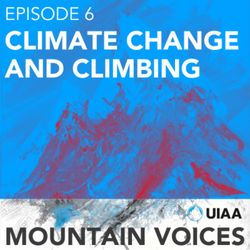
6. Climate Change and Climbing
50:20||Season 1, Ep. 6The final episode in Season One of Mountain Voices focuses on climate change and specifically three fascinating case studies. François Masse (Superintendent/Lake Louise, Parks Canada) charts both the factors which led to the loss of Abbot Pass Hut, a national historic site in Canada, and the lessons learnt. Piolet d’Or recipient Graham Zimmerman provides the insight of a professional climber who has witnessed the impact of climate change firsthand and who today is a major advocate for mountain protection. Pedro Lacaz Amaral, CEO & Founder of the Gear Tips Recycling Program in Brazil, offers positive news from an environmental project which won the 2023 UIAA Mountain Protection Award for its initiative in creating a system to properly collect and recycle gas cartridges.Discover more:Abbot Pass HutGear Tips Recycling ProgramGraham ZimmermanAbout Mountain VoicesMountain Voices is a podcast from the UIAA. Throughout each series, the UIAA explores different climbing and mountaineering topics. The series provide a platform for both experts from the UIAA and renowned figures from the mountain world to share their views and opinions. Each series is made of up of six episodes. Season 1 launched in February 2024 with Season 2 to follow later in the year.https://www.theuiaa.org/mountainvoices/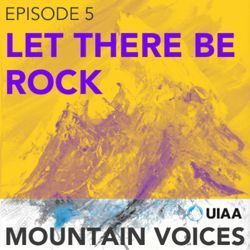
5. Let There Be Rock
36:41||Season 1, Ep. 5In exclusive interviews, two legends from the world of rock climbing – Adam Ondra and Beth Rodden – share their passion for the sport.Adam Ondra, from the Czech Republic, is often described as the world’s best climber. His list of hard ascents is staggering – including some 130 routes graded 9a or above. It was way back in 2012 that he climbed the world’s first 9b+ in Flatanger, Norway. In 2016 at the age of 23 he repeated Tommy Caldwell and Kevin Jorgeson’s Dawn Wall in just eight days – it took them 19. He’s a familiar face on the podium of the IFSC circuit and is currently preparing for Paris 2024 qualification.Beth Rodden is inextricably linked with some of the hardest climbs in Yosemite, having made a number of historic free ascents, including the first free ascent of Lurking Fear in 2001 and a free repeat of The Nose in 2005, set by her childhood hero, Lynn Hill. With Meltdown in 2008, she established the hardest first ascent of a single pitch ever done by a woman. Beth recently released her autobiography: A Light through the Cracks: A Climber's Story. In it, she doesn’t hold back and details not just the climbing adventures, but the long-lasting trauma of a much-publicised kidnap ordeal in Kyrgyzstan, the breakdown of her relationship and climbing partnership with Tommy Caldwell, the inequality in female sponsorship and her battles with injury not to mention, herself.The UIAA thanks Mammut for their support in organising the interview with Adam Ondra.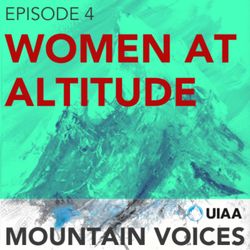
4. Women at Altitude
45:38||Season 1, Ep. 4Episode 4 of Mountain Voices focuses on the subject of women at altitude. Inspiration came from the work of the UIAA Medical Commission who have played a leading role in the publication of a number of papers dedicated to women and mountaineering. Topics covered across the papers include altitude sickness, frostbite, nutrition and papers on female-specific issues like menopause. Mountain Voices tackles the following questions: Are women more or less prone to cold and altitude related illnesses than men? Do women need to follow different advice? and do women make safer mountaineers? Contributions come from two of the authors of the UIAA Medical Commission papers, namely Dr Jacqueline Pichler Hefti, a Senior Physician at the University of Bern, Clinic for Pulmonary Medicine and Dr Alison Rosier, an Organisational Psychologist & Strategic Change Consultant. IFMGA guide Emilie Drinkwater, the ninth woman to qualify as a full mountain guide in the United States, and a leader of several expeditions all over the world, offers the perspective of climbing with both all female and all male groups. Further details on the UIAA Medical Commission papers can be found here.The recently released women in mountaineering papers, the result of a number of years of dedicated research and work, have been published in the High Altitude Medicine & Biology journal. They are available to view, free of charge, until November 2024.----Mountain Voices is a podcast series from the International Climbing and Mountaineering Federation (UIAA)Presented and produced by Tarquin CooperCo-produced by Peter BourneEdited by Tom Tushaw